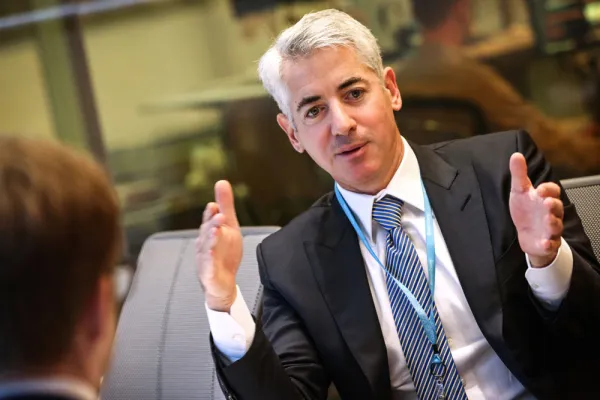As Bill Ackman seeks the dismissal of a lawsuit against his beleaguered SPAC, he’s arguing that the Securities and Exchange Commission has helped his case.
The SEC’s proposed rule on special purpose acquisition companies doesn’t say that Pershing Square Tontine Holdings nor any other SPAC is an investment company that would fall under the rules of the Investment Company Act of 1940, Ackman’s lawyer said in a letter to a judge overseeing the lawsuit, which claims otherwise.
“If anything, the proposed rule underscores yet again — as defendants have argued all along — that the SEC, not an opportunistic private litigation, is the statutory gatekeeper with the regulatory authority and responsibility for assessing whether a SPAC is an investment company,” wrote Roberta Kaplan, an attorney for the Pershing Square defendants, in the letter filed Monday.
Ackman’s letter to the judge also pointed out that the proposed rule is not yet law and may never be, and therefore should not be considered an authority in this case. The SEC is accepting comments on the rule proposal until May 31, and so far, the reaction has been minimal. Only six people have responded, and none of them address the specifics of the proposed changes.
The SEC never expressed any interest in bringing SPACs under the purview of the Investment Company Act, with its stricter rules, before two securities law professors, including one who is a former commissioner at the SEC, brought a case against Pershing Square on those grounds last summer. They later sued two other SPACs but stopped there after an uproar from the legal community representing SPACs.
Then, suddenly, the issue popped up in a March 30 SEC hearing at which several new rules governing SPACs were proposed. “The line between a SPAC and an investment company is blurry,” Chairman Gary Gensler said in his opening remarks at the hearing.
The proposed rule went further, stating “We believe that certain SPAC structures and practices may raise serious questions as to their status as investment companies.”
It explained that “as the SPAC market has grown dramatically in recent years, some SPACs have sought to operate in novel ways that suggest a need for SPACs and their sponsors to increase their focus on evaluating when a SPAC could be an investment company and thus subject to the requirements under the Investment Company Act of 1940.”
Though it did not mention Ackman’s SPAC by name, Tontine certainly did plan to act in a “novel” way when it agreed to take a stake in the spinoff IPO of Universal Music Group from Vivendi last summer instead of merging with a private company, as is the customary SPAC approach. The SEC told Ackman that it did not think the deal would qualify as a SPAC, and he quickly canceled the plans.
In its proposed rule, however, the SEC acknowledged that “SPACs are generally formed to identify, acquire, and operate a target company through a business combination and not with a stated purpose of being an investment company.”
The SEC is proposing an 18-month safe harbor for SPACs to avoid being considered an investment company. Ackman’s SPAC is already beyond that, and so are plenty of others, given the vast number of SPACs listed in the last 18 months that have yet to find a merger partner. Ackman’s letter noted that the proposed rule says nothing about whether any such rule would be applied retroactively. That could be important as to its ultimate impact. A 24-time month period used to be the norm, but last year more SPAC IPOs shrank the window for making a deal, with the average timeframe now at 15 months.
Most of the SEC’s other proposed SPAC changes — more disclosure and more liability for making misleading projections — were expected. But a rule suggesting a safe harbor for SPACs to avoid investment company status seemed to come out of nowhere.
One person who expressed support for the arguments raised by the academics suing Pershing Square is the SEC’s new director of the division of investment management, William Birdthistle, as Institutional Investor previously reported.
When the SEC commissioners met to present the new rules, Birdthistle was among those speaking.
“It’s the first time that the commission has specifically addressed the question of whether SPACs are investment companies,” he noted.







